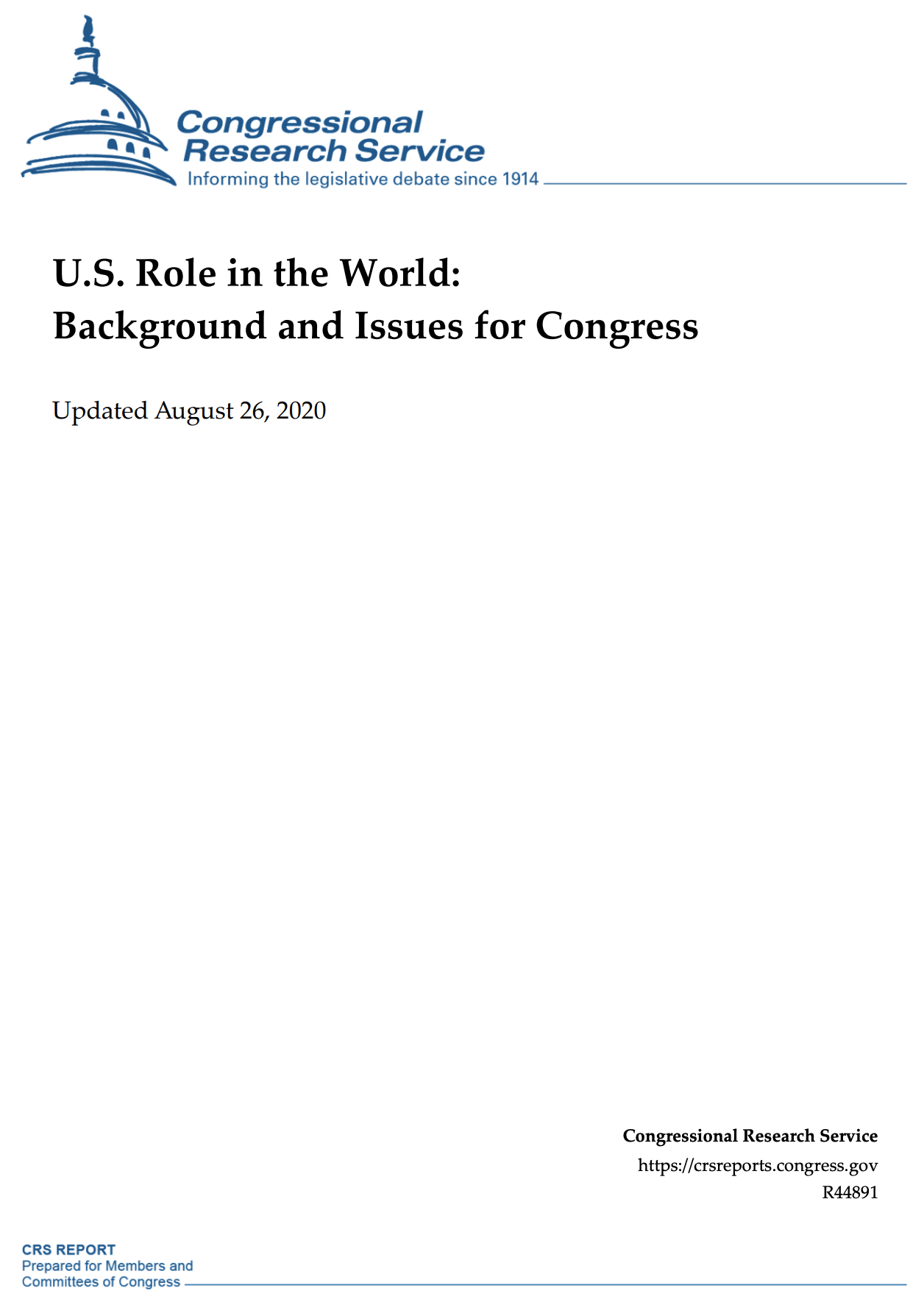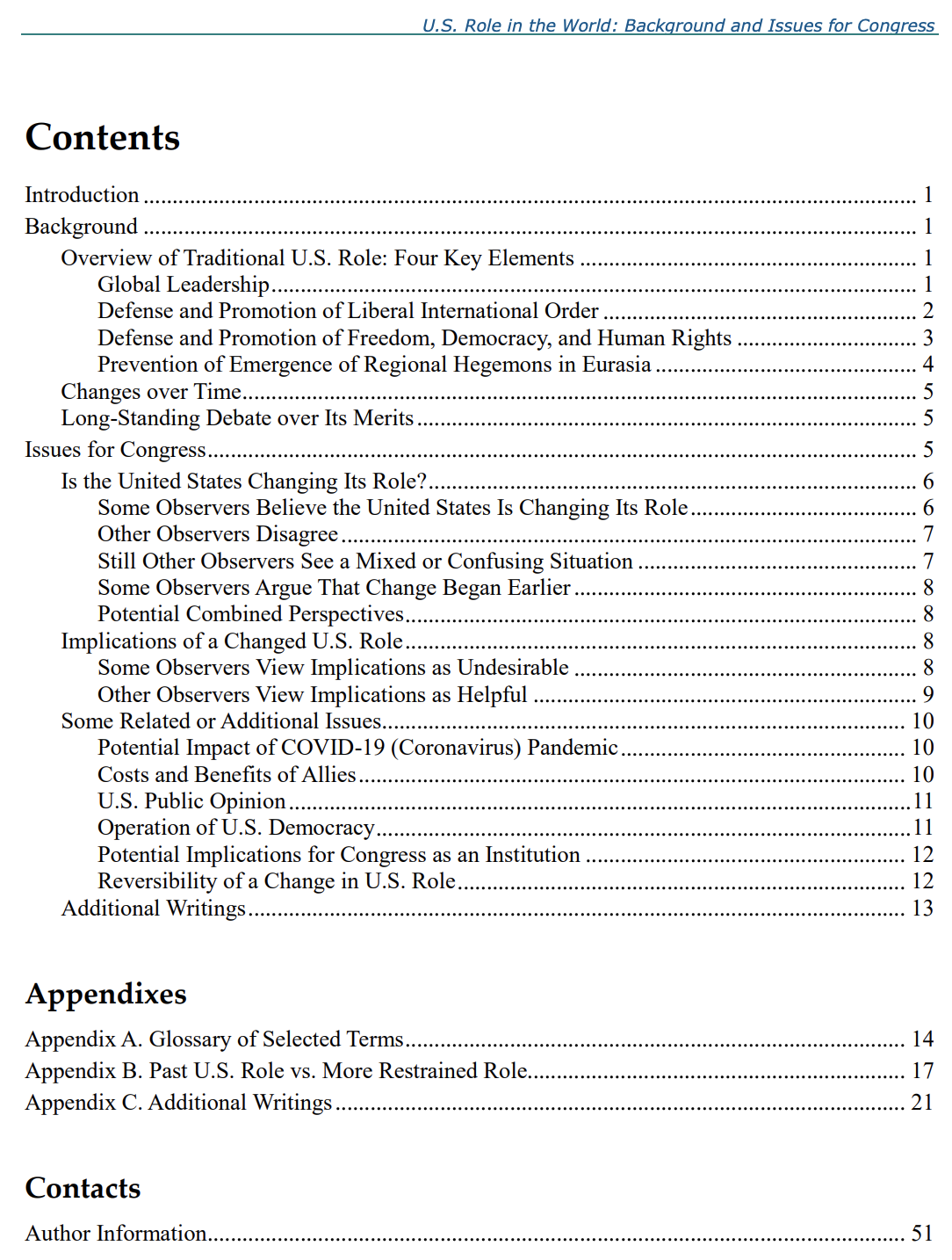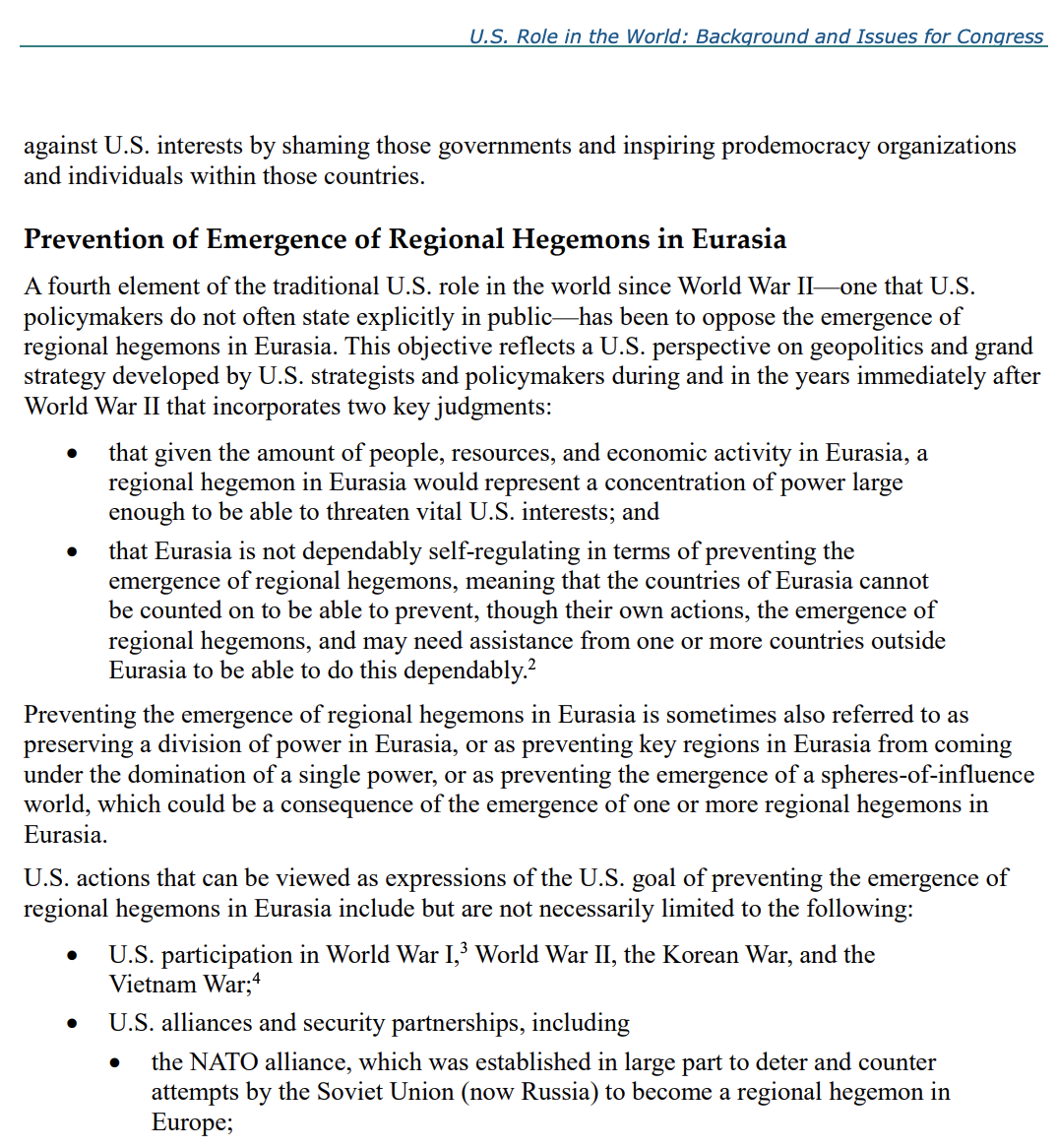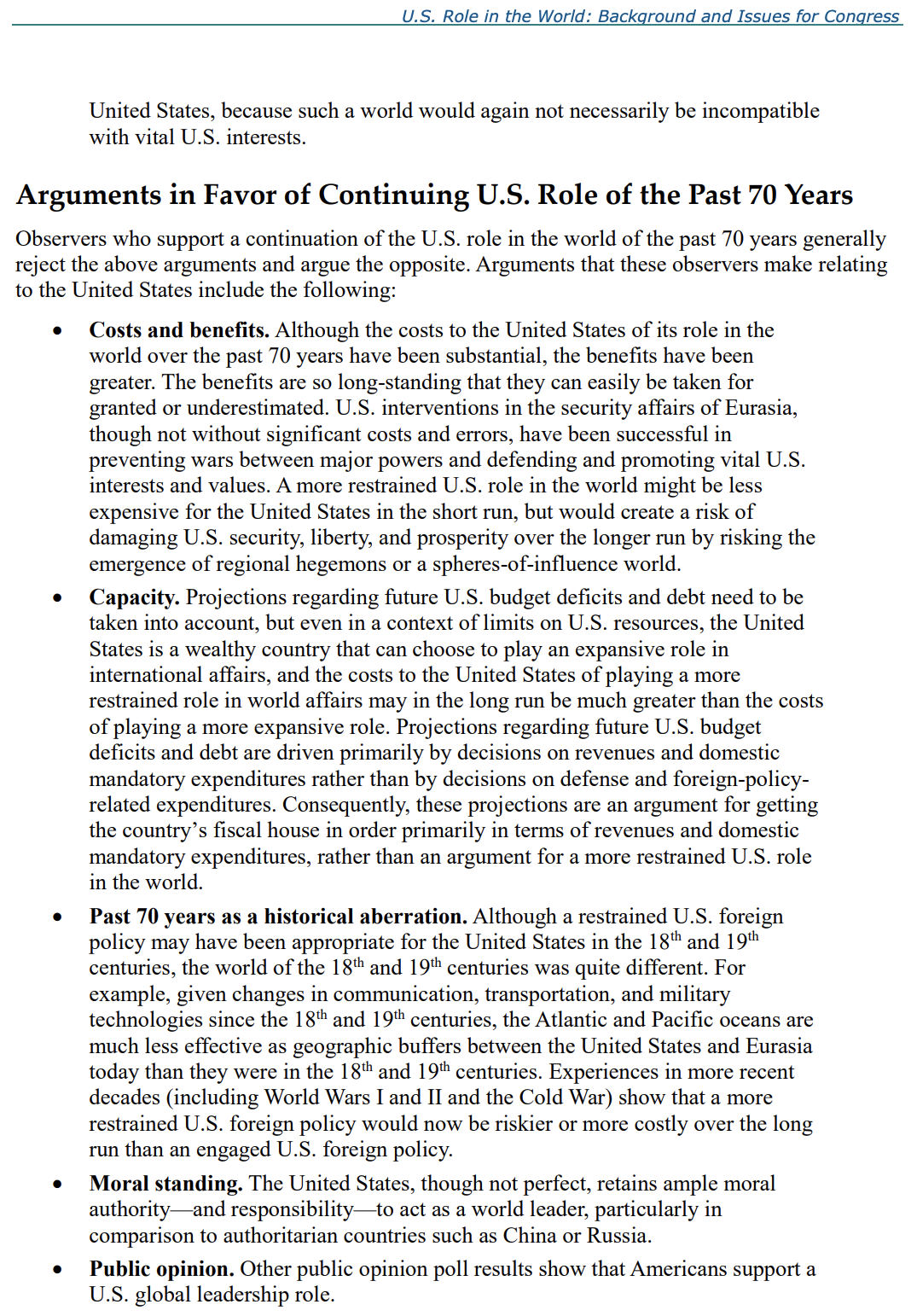“U.S. Role in the World: Background & Issues for Congress”—Updated CRS Report Has Major China/Russia Coverage
Ronald O’Rourke, U.S. Role in the World: Background & Issues for Congress R44891 (Washington, DC: Congressional Research Service, 26 August 2020).
If you have trouble accessing the website above, please download a cached copy here.
You can also click here to access the report via the new public CRS website.
Summary
The U.S. role in the world refers to the overall character, purpose, or direction of U.S. participation in international affairs and the country’s overall relationship to the rest of the world. The U.S. role in the world can be viewed as establishing the overall context or framework for U.S. policymakers for developing, implementing, and measuring the success of U.S. policies and actions on specific international issues, and for foreign countries or other observers for interpreting and understanding U.S. actions on the world stage.
While descriptions of the U.S. role in the world since the end of World War II vary in their specifics, it can be described in general terms as consisting of four key elements: global leadership; defense and promotion of the liberal international order; defense and promotion of freedom, democracy, and human rights; and prevention of the emergence of regional hegemons in Eurasia.
The issue for Congress is whether the U.S. role in the world is changing, and if so, what implications this might have for the United States and the world. A change in the U.S. role could have significant and even profound effects on U.S. security, freedom, and prosperity. It could significantly affect U.S. policy in areas such as relations with allies and other countries, defense plans and programs, trade and international finance, foreign assistance, and human rights.
Some observers, particularly critics of the Trump Administration, argue that under the Trump Administration, the United States is substantially changing the U.S. role in the world. Other observers, particularly supporters of the Trump Administration, while acknowledging that the Trump Administration has changed U.S. foreign policy in a number of areas compared to policies pursued by the Obama Administration, argue that under the Trump Administration, there has been less change and more continuity regarding the U.S. role in the world.
Some observers who assess that the United States under the Trump Administration is substantially changing the U.S. role in the world—particularly critics of the Trump Administration, and also some who were critical of the Obama Administration—view the implications of that change as undesirable. They view the change as an unnecessary retreat from U.S. global leadership and a gratuitous discarding of long-held U.S. values, and judge it to be an unforced error of immense proportions—a needless and self-defeating squandering of something of great value to the United States that the United States had worked to build and maintain for 70 years.
Other observers who assess that there has been a change in the U.S. role in the world in recent years—particularly supporters of the Trump Administration, but also some observers who were arguing even prior to the Trump Administration in favor of a more restrained U.S. role in the world—view the change in the U.S. role, or at least certain aspects of it, as helpful for responding to changed U.S. and global circumstances and for defending U.S. values and interests, particularly in terms of adjusting the U.S. role to one that is more realistic regarding what the United States can accomplish, enhancing deterrence of potential regional aggression by making potential U.S. actions less predictable to potential adversaries, reestablishing respect for national sovereignty as a guidepost for U.S. foreign policy and for organizing international affairs, and encouraging U.S. allies and security partners in Eurasia to do more to defend themselves.
Congress’s decisions regarding the U.S. role in the world could have significant implications for numerous policies, plans, programs, and budgets, and for the role of Congress relative to that of the executive branch in U.S. foreign policymaking.
p. 4
Prevention of Emergence of Regional Hegemons in Eurasia
A fourth element of the traditional U.S. role in the world since World War II—one that U.S. policymakers do not often state explicitly in public—has been to oppose the emergence of regional hegemons in Eurasia. This objective reflects a U.S. perspective on geopolitics and grand strategy developed by U.S. strategists and policymakers during and in the years immediately after World War II that incorporates two key judgments:
- that given the amount of people, resources, and economic activity in Eurasia, a regional hegemon in Eurasia would represent a concentration of power large enough to be able to threaten vital U.S. interests; and
- that Eurasia is not dependably self-regulating in terms of preventing the emergence of regional hegemons, meaning that the countries of Eurasia cannot be counted on to be able to prevent, though their own actions, the emergence of regional hegemons, and may need assistance from one or more countries outside Eurasia to be able to do this dependably.2
Preventing the emergence of regional hegemons in Eurasia is sometimes also referred to as preserving a division of power in Eurasia, or as preventing key regions in Eurasia from coming under the domination of a single power, or as preventing the emergence of a spheres-of-influence world, which could be a consequence of the emergence of one or more regional hegemons in Eurasia.
U.S. actions that can be viewed as expressions of the U.S. goal of preventing the emergence of regional hegemons in Eurasia include but are not necessarily limited to the following:
- U.S. participation in World War I,3 World War II, the Korean War, and the Vietnam War;4
- U.S. alliances and security partnerships, including
- the NATO alliance, which was established in large part to deter and counter attempts by the Soviet Union (now Russia) to become a regional hegemon in Europe;
***
2 For additional discussion, see CRS In Focus IF10485, Defense Primer: Geography, Strategy, and U.S. Force Design, by Ronald O’Rourke.
3 Although the goal of preventing the emergence of regional hegemons was not articulated in explicit terms (at least not widely) by U.S. strategists until World War II and the years immediately thereafter, U.S. participation in World War I against Germany can in retrospect be viewed as an earlier U.S. action reflecting this goal.
4 U.S. participation in the Vietnam War was justified in part by the so-called domino theory, which argued that a victory by communist-ruled North Vietnam over South Vietnam could be followed by other countries in the region falling, like dominos in a row, under communist control. Opponents of the domino theory challenged its validity and argue that it was disproven when North Vietnam’s defeat of South Vietnam was not followed by other countries in the region falling under communist control. The theory’s supporters argue that the theory was not disproven, because the years-long U.S. effort to defend South Vietnam, though ultimately unsuccessful in preventing victory by North Vietnam, gave other countries in the region time and space to develop their political institutions and economies enough to deter or resist communist movements in their own countries. Valid or not, the domino theory’s use as a justification links U.S. participation in the war to the goal of preventing the emergence of a regional hegemon (in this case, a communist hegemon of China and/or the Soviet Union).
p. 5
- U.S. alliances with countries in East Asia and the Pacific, which were established in large part to deter and counter attempts by the Soviet Union or China to become a regional hegemon in East Asia; and
- U.S. security partnerships with countries in the Persian Gulf region, which were established in large part to deter or counter attempts by Iran or the Soviet Union (now Russia) to become a regional hegemon in that region; and
- additional U.S. political, diplomatic, and economic actions to contain and oppose the Soviet Union during the Cold War, including the Marshall Plan and subsequent U.S. foreign assistance programs.
In pursuing the goal of preventing the emergence of regional hegemons in Eurasia, U.S. policymakers have sometimes decided to work with or support nondemocratic regimes that for their own reasons view Russia, China, or Iran as competitors or adversaries. As a consequence, the goal of preventing the emergence of regional hegemons in Asia has sometimes been in tension with defending and promoting freedom, democracy, and human rights.
p. 19
Arguments in Favor of Continuing U.S. Role of the Past 70 Years
Observers who support a continuation of the U.S. role in the world of the past 70 years generally reject the above arguments and argue the opposite. Arguments that these observers make relating to the United States include the following:
- Costs and benefits. Although the costs to the United States of its role in the world over the past 70 years have been substantial, the benefits have been greater. The benefits are so long-standing that they can easily be taken for granted or underestimated. U.S. interventions in the security affairs of Eurasia, though not without significant costs and errors, have been successful in preventing wars between major powers and defending and promoting vital U.S. interests and values. A more restrained U.S. role in the world might be less expensive for the United States in the short run, but would create a risk of damaging U.S. security, liberty, and prosperity over the longer run by risking the emergence of regional hegemons or a spheres-of-influence world.
- Capacity. Projections regarding future U.S. budget deficits and debt need to be taken into account, but even in a context of limits on U.S. resources, the United States is a wealthy country that can choose to play an expansive role in international affairs, and the costs to the United States of playing a more restrained role in world affairs may in the long run be much greater than the costs of playing a more expansive role. Projections regarding future U.S. budget deficits and debt are driven primarily by decisions on revenues and domestic mandatory expenditures rather than by decisions on defense and foreign-policy-related expenditures. Consequently, these projections are an argument for getting the country’s fiscal house in order primarily in terms of revenues and domestic mandatory expenditures, rather than an argument for a more restrained U.S. role in the world.
- Past 70 years as a historical aberration. Although a restrained U.S. foreign policy may have been appropriate for the United States in the 18th and 19th centuries, the world of the 18th and 19th centuries was quite different. For example, given changes in communication, transportation, and military technologies since the 18th and 19th centuries, the Atlantic and Pacific oceans are much less effective as geographic buffers between the United States and Eurasia today than they were in the 18th and 19th centuries. Experiences in more recent decades (including World Wars I and II and the Cold War) show that a more restrained U.S. foreign policy would now be riskier or more costly over the long run than an engaged U.S. foreign policy.
- Moral standing. The United States, though not perfect, retains ample moral authority—and responsibility—to act as a world leader, particularly in comparison to authoritarian countries such as China or Russia.
- Public opinion. Other public opinion poll results show that Americans support a U.S. global leadership role.









































